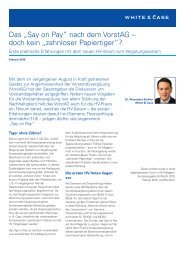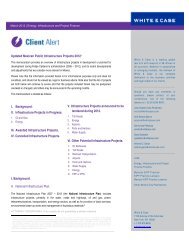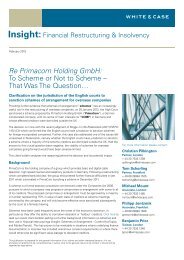Mexican Legal Framework of Business Insolvency - White & Case
Mexican Legal Framework of Business Insolvency - White & Case
Mexican Legal Framework of Business Insolvency - White & Case
Create successful ePaper yourself
Turn your PDF publications into a flip-book with our unique Google optimized e-Paper software.
84<br />
Some clarifications are in order:<br />
■■ Claims described in Items 1, 2, 3 and 4 are referred to in the <strong>Insolvency</strong> Law as claims<br />
against the estate [LCM 224].<br />
■■ Claims described in Items 5 and 6 are referred to in the <strong>Insolvency</strong> Law as singularly<br />
privileged claims [LCM 218].<br />
■ ■ Secured claims referred to in Item 7 are those that are secured by a mortgage or<br />
a pledge. These claims are paid out <strong>of</strong> the proceeds <strong>of</strong> the property that have been<br />
collateralized against the mortgage or pledge, and generally in the order that the<br />
pledges or mortgages have been registered in accordance with applicable law<br />
[LCM 219].<br />
■ ■ Priority claims referred to in Item 9 are those from creditors with a privilege or a<br />
retention right (e.g., a mechanics lien). These claims are paid out <strong>of</strong> the proceeds <strong>of</strong><br />
the retained property and are generally paid in the order <strong>of</strong> privilege that has been<br />
registered in accordance with applicable law or by the date <strong>of</strong> the claims [LCM 220].<br />
■ ■ Unsecured claims referred to in Item 10 are all others not otherwise specified. These<br />
claims collect proceeds <strong>of</strong> the estate on a pro rata basis [LCM 222].<br />
d. Asset Liquidation<br />
Value maximization and the preservation <strong>of</strong> a going concern are the overriding principles<br />
underlying asset liquidation [LCM 197].<br />
Upon the quiebra declaration, the receiver will sell <strong>of</strong>f the assets <strong>of</strong> the estate, and<br />
shall attempt to receive the highest return on the sale. If the sale <strong>of</strong> productive units<br />
allows for receiving the highest proceeds from the sale, the receiver must consider the<br />
advisability <strong>of</strong> keeping the enterprise as a going concern [LCM 197].<br />
In principle, the sale must be carried out through public auction [LCM 198]. The receiver<br />
may employ different means <strong>of</strong> sale in the case <strong>of</strong> perishable goods [LCM 208] or, prior<br />
judicial authorization, if such alternative means <strong>of</strong> sale would yield a higher value for the<br />
asset in question [LCM 205].
















